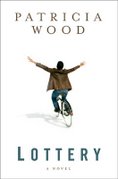
7:44 AM and 76 degrees. Another chilly morning in Honolulu.
One of the most interesting things about having a novel published in other countries is working with translators. For those of you who are unfamiliar with how things work. This will be a quick tutorial (those familiar can skip ahead to the end-of-chapter quiz).
My novel was sold to Putnam and they bought only North American rights (English) so LOTTERY has been sold to other countries (Italy, Israel, the Netherlands, England, Sweden, Japan, Portugal, Korea, Spain, Finland, China, Taiwan, Russia, Romania...well you get the picture...)
When a country buys a novel they are responsible for doing the translation. And that's when it gets REALLY fun and fascinating.
I love language (of course I'm a writer!) so it's interesting to me to see how this is all done. Many times the author is unaware that the translation has been completed. For instance my Dutch publisher translated Lottery and I didn't know a thing! I sent a Dutch copy of LOTERIJ to my cousin Helge in Norway - who read it and pronounced it wonderful. The Dutch translator just made a minor alteration -- they changed my horse's name on the dedication page from "Airborne" to "Piloot". I like "Piloot" a lot and may name my next horse that.
My Swedish translator just needed to know whether my aunt (mentioned in my acknowledgments page) was my maternal aunt or paternal aunt as in Sweden there are distinct names for each. I thought that was remarkable.
My Korean publisher asked me to write a preface for my Korean readers and that was great fun...
But I have to say my most enjoyable experience so far has been being able to work with my diligent and brilliant Japanese translator Sayuri Kobayashi.
We both discovered that some of my words needed clarification. For example how would you all describe the Lottery ticket above in a way any reader anywhere could visualize it?
Washington State lottery tickets come in strips and you get two chances to win for each dollar paid. The ticket above is like the one Perry bought each week. It's five dollars worth of lottery tickets but just on one piece of paper. For those older people (like me!) the first lotto tickets were a single ticket that you scratched off and exposed your numbers...times change... and with the advent of computers the Lotto tickets changed as well...I digress...
And there were other things.
I had to explain when Gram expressed disgust "Mild Schmild!!! Education Schmeducation!"
Schmeducation is NOT in the English dictionary as Sayuri found out...
How would you translate that?!
Any of you who have grandparents who use colloquialisms or local turns of phrases can easily see how complex this can get. The translator then has a really important job to not only be true to the author's intent but allow their readers to understand in that particular language.
I have a lot of respect and admiration for translators who work with literature.
It's hard work. How do you translate slang?
And jokes!
How do you translate puns? And word play?
EGADS!! Wait. How do you translate this?
It's enough to make you want to pull your hair out...or shave your head... or tug your tresses...
Get the picture? um well er (Now how do I translate THAT!?)
So this post is to Sayuri san and all my other wonderful translators.
SAYURI SAN WA
SUBARASII HON YA KUKA
DESU!!!!
YOU ALL SO TOTALLY ROCK!!!
Now that can be understood in EVERY language!


























18 comments:
As an avid travler, I understand the "fun" you can have with language! I know a Japanese translator and she does not have an easy job. Great post.
I think it's wonderful they're consulting with you to get things right.
Great post. We all take our own idiomatic expressions for granted. Your lotto ticket looks a lot like ours, except ours have a pretty yellow colour.
AHHhahahahahahaha! Love the blog! Reminds me of some of my blunders trying to speak another language. The embarrassing blunder was when i thought i was expressing my excitement/happiness for a family when i was really saying excitement/arousal in their slang! and no one corrected me until about the 10th time i said it! oh for Petesake!
~dawn anon
I'm so glad you understand how hard it is to translate novels.
It's really difficult, but a fun to do.
I love my job and appreciate a chance to translate Lottery!
Fascinating! The quality of a translation makes such a difference to the reader’s experience of the book. You can usually tell when the translation doesn’t quite convey exactly what the author intended. And when a translation is good, you don’t even notice you’re not reading the original work.
How much fun! Sounds like another perk of a terrific career. (I'm hooked, where do I sign?!) And I have a feeling your translators had just as much working with you, Pat. Who wouldn't? K.
Aloha Sayuri--I'm so glad you commented. I think many people don't realize the work that goes into translations.
And yes...you CAN have fun with language and make hilarious mistakes!
This is an interesting post! I love international talks. And how DO YOU translate slang? Or do they just come up with the next best thing?
Translators have my deep respect for a job not easily understood around the world.
Great post, Pat. Ever use Alta Vista Babel fish to translate a sentence into another language and then back to English> It's crazy!
It kind of looks like this:
Large post, pat. Always fish Alta Vista babel benefit in order to transfer proposal into another language and after this back to English it is crazy!
That was English to Russian to English.
A very interesting post!
To translate slang,jokes and puns are really difficult.
I have to say it's impossible to do it 100 percent accuracy.
Translators should make a choice.
Funny or right.
Sometimes we have to cut off some words to express what the author would really want to tell readers.
Some times we have to add words to do that.
Yes, slang is difficult.
I'll tell something.
Buddha is a slang for "murdered person" among the cops.
I don't know if real policemen say it.
If you use this Buddha in translation, some readers think it strange......Would the American cops say Buddha?
Anyway, it's really fun to wonder.
Great post. I'd never thought of translations in this way.
Now that is very interesting, Sayuri,
To be funny or right?
I can see the translator's difficult problem.
hmmm...
I think as an author I would rather have my "intent" understood within the constructs of the language and if another joke can be substituted then so be it.
That is why good translators are so precious.
Let's all give a virtual cheer to Sayuri!!!
Aloha, thank you very much about your comment.
I really hope to read your book in Italian, can I find it to London?
Maybe I can to read it in English.
I hope Sarah's role will be Cherry ^_^
I really love Sarah and I would like to meet her one day; )
Enjoyable post! I used to work with ESL elementary students. SOOO cute, all these translation issues that you talk about!
Good luck with all of this!
:-)
hey Pat, thanks for the link to kevins blogsite. AWESOME. It is difficult to explain the turtle cleaning station to people and NOW there is great footage!!!!!!
I love to visit your blog everyday so keep em coming!!!!
Mary
Thanks for sharing that, Pat. And,wow, so many foreign sales! Are you a best seller in any countries?
Post a Comment